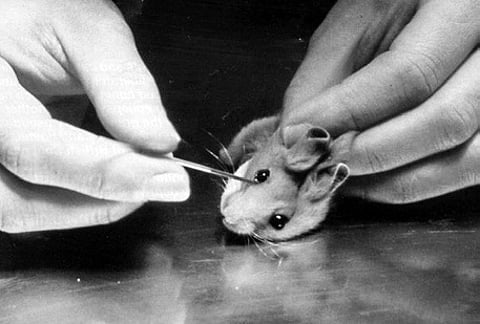

In a landmark shift, the US Food and Drug Administration (FDA) has announced a transformative initiative to advance public health by replacing animal testing in drug development—including monoclonal antibody therapies—with more effective, human-relevant methods.
This innovative approach aims not only to address the ethical concerns associated with animal testing but also to enhance drug safety and streamline the evaluation process. By reducing reliance on animal experimentation, the initiative is expected to lower research and development (R&D) costs, ultimately contributing to more affordable drug prices.
This new regulatory regime as far as drug development is concerned will not only impact drug research industry in the US, but could also have global implications—including in India—as many countries target the US market, the largest pharmaceutical market in the world by value.
In its important regulatory update on Friday, the FDA stated that the animal testing requirement may be replaced by a range of more human-relevant approaches, including AI-driven computational toxicity models and cell line or organoid-based toxicity testing conducted in laboratory settings. These methods, collectively referred to as New Approach Methodologies (NAMs), are poised to redefine preclinical research.
Organoids—lab-grown human tissues or organ-on-a-chip systems—mimic human organs such as the liver, heart, and immune system to test drug safety. These models can detect toxic effects that may go unnoticed in animal studies, offering a more accurate window into human responses.
Implementation of this new drug development framework will begin immediately for Investigational New Drug (IND) applications, with the FDA encouraging the inclusion of NAMs data. A roadmap detailing the transition has been released. Additionally, to evaluate efficacy, the FDA will begin incorporating pre-existing, real-world safety data from countries with comparable regulatory standards, where the drug has already been studied in human populations.
“For too long, drug manufacturers have conducted additional animal testing on drugs already in broad human use internationally. This initiative marks a paradigm shift in drug evaluation and holds promise to accelerate cures and meaningful treatments for Americans while reducing animal use,” said FDA Commissioner Dr. Martin A. Makary in an official industry communication.
“By leveraging AI-based computational modeling, human organ model-based lab testing, and real-world human data, we can deliver safer treatments to patients more quickly and reliably, while also lowering R&D costs and drug prices. It’s a win-win for public health and ethics,” he added.
Key Benefits of Replacing Animal Testing
The new R&D roadmap encourages drug developers to utilize computer modeling and artificial intelligence to predict how a drug behaves in the human body. For example, software simulations can estimate how a monoclonal antibody distributes throughout the body and predict potential side effects based on molecular composition.
“We believe this will drastically reduce the need for animal trials,” the FDA noted.
The agency also emphasised the importance of organoid and organ-on-a-chip technologies in mimicking human organs to better assess toxicity. These tools offer a more precise insight into human responses, improving the safety profile of investigational therapies.
To support the transition, the FDA will update its guidelines to permit the inclusion of data from these alternative methods. Companies that submit robust non-animal-based safety data may benefit from streamlined regulatory reviews, as certain animal studies will no longer be required. This incentive is expected to drive further investment into modernized testing platforms.
Adoption of these technologies is anticipated to accelerate the drug development timeline, enabling treatments such as monoclonal antibodies to reach patients more quickly—without compromising safety.
With this move, the FDA reaffirms its position as a global leader in regulatory science, setting new standards for the pharmaceutical industry and encouraging the use of innovative, humane testing methods.
In recent years, both the scientific community and the U.S. Congress have called for more human-relevant alternatives to animal testing. “Today’s announcement reflects the FDA’s commitment to modernizing regulatory science as technology evolves,” the agency said.
In collaboration with federal agencies like the National Institutes of Health, the National Toxicology Program, and the Department of Veterans Affairs, the FDA will support the adoption of these methods through the Interagency Coordinating Committee on the Validation of Alternative Methods (ICCVAM).
A public workshop is planned later this year to discuss the roadmap and gather stakeholder input. Over the next year, the FDA will launch a pilot program allowing select developers of monoclonal antibodies to pursue a primarily non-animal-based testing strategy, under close regulatory consultation. The results from this pilot will inform broader policy updates expected to roll out in phases.
Emphasising the broader implications, the FDA Commissioner stated:
“For patients, this means a more efficient pipeline for novel treatments. It also adds a margin of safety, since human-based test systems may better predict real-world outcomes. For animal welfare, it marks a significant step toward ending the use of laboratory animals in drug testing. Thousands of animals—including dogs and primates—could ultimately be spared each year as these methods take root.”
Reacting to the FDA’s move, a senior executive from a leading pharmaceutical research organisation noted that while it will require more sophistication in R&D processes—and many domestic research labs will need to upgrade their methodologies—it marks the beginning of a new era. "One where R&D cost dynamics shift, and ethical concerns raised by animal welfare advocates are meaningfully addressed," he said seeking not to be identified as he is not authorised to speak on behalf of the institution.